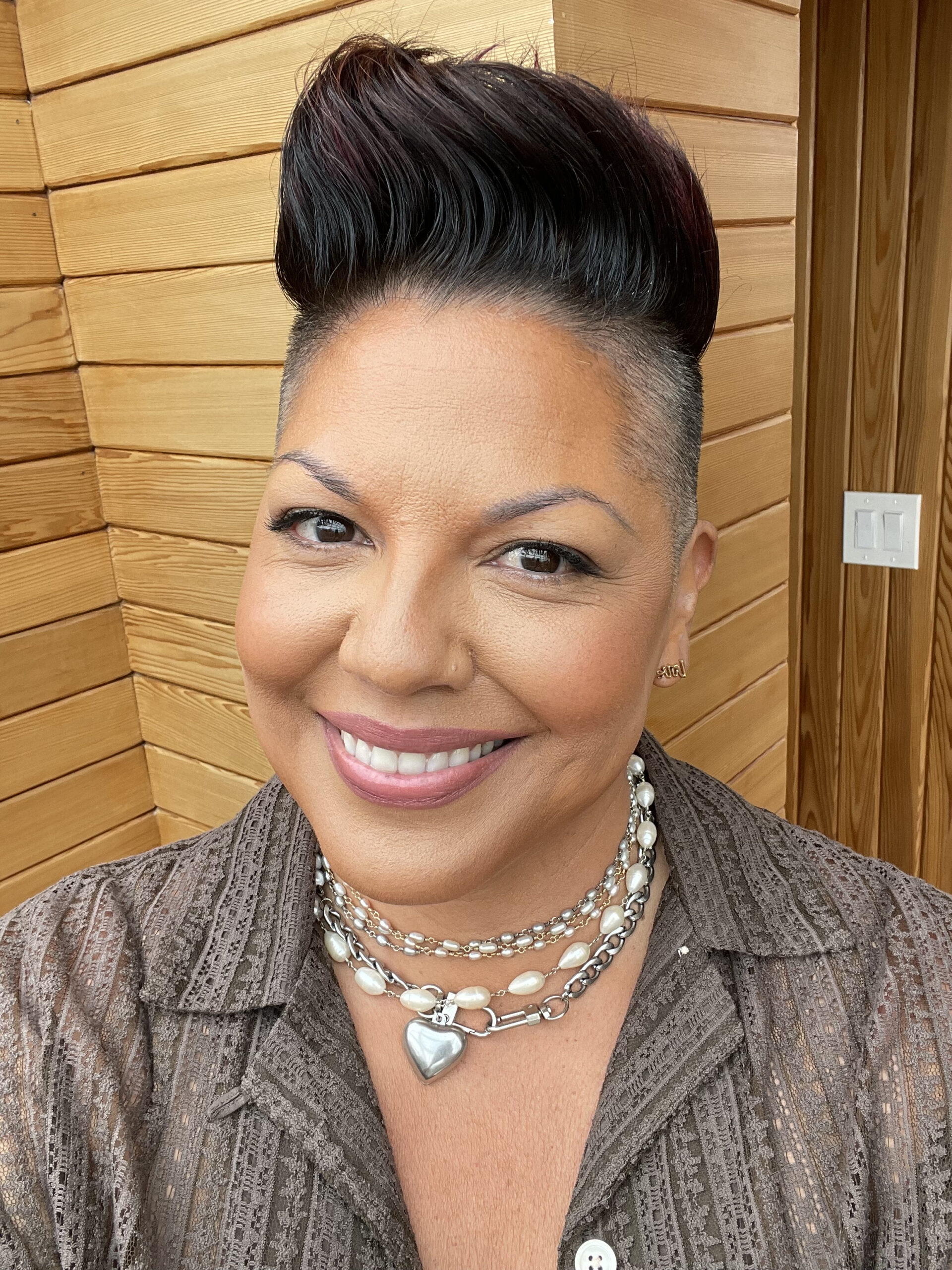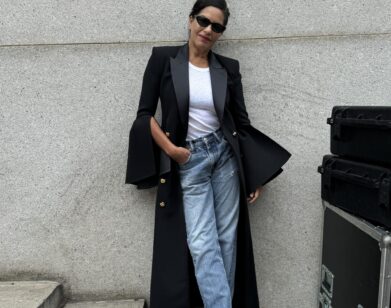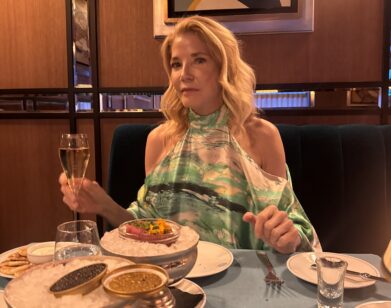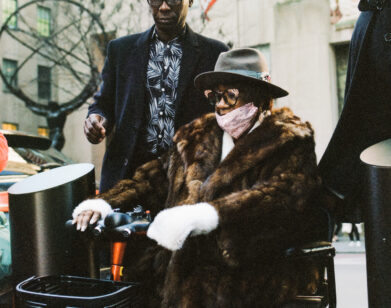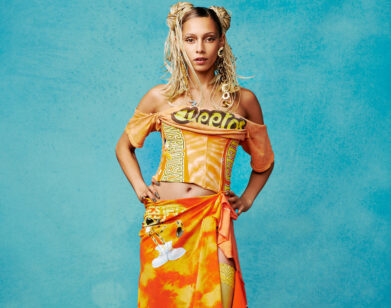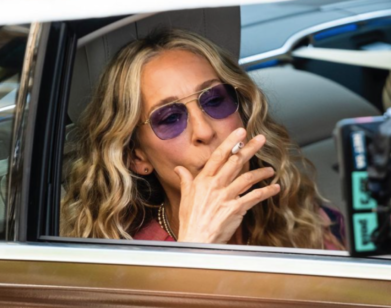IN CONVERSATION
Sara Ramirez Knows What You Think About Che Diaz
Sara Ramirez started their television career playing the bisexual surgeon Callie Torres on Grey’s Anatomy and now plays Che Diaz, the podcasting stand-up comic who, in the first season of And Just Like That…, famously made Miranda Hobbes climax in Carrie Bradshaw’s kitchen. Despite mixed fan reactions to Diaz, the lightning rod of the Sex and the City reboot, they also remind us that queer characters aren’t a monolith. “Just because we don’t like a character doesn’t mean that we get to legislate them out of existence,” Ramirez told their friend Jordan Cooper, whose biting play Ain’t No Mo’ premiered this past December, garnering six Tony nominations and making him the youngest Black playwright on Broadway. The love goes both ways for this pair: last year, when it was announced that Ain’t No Mo’ would be leaving Broadway after only three weeks, Ramirez joined Will Smith and Queen Latifah in a successful campaign to extend the show’s run. In honor of Che Diaz’s return to streaming (season two of AJLT premieres on Max tonight), Ramirez and Cooper hopped on a call to discuss the virtues and shortcomings of representational politics, pushing Carrie, Charlotte, and Miranda to their edges, and being proud during Pride Month, plus the other 11 months of the year.—EMMA SCHARTZ
———
SARA RAMIREZ: Hi, Jordan.
JORDAN COOPER: Hey, hey, how are you?
RAMIREZ: I’m well. It’s so great to be on this call with you. It’s been a minute since we last connected, but thank you for being here and sharing your energy with us today.
COOPER: Thank you so much for having me. I’m so excited.
RAMIREZ: I’m going to start with a broad question, but I really want people to get to know who you are. Can you share a little bit about your journey as a playwright, from your early influences to your breakthrough on Broadway and what challenges you faced along the way?
COOPER: Oh, oh, not my biography. Listen, it’s a journey, okay? I started writing when I was six years old. I would be making movies and doing plays in my living room. I constantly knew I wanted to do storytelling. I didn’t know that it was actually a career. I used to try to convince my elementary school teachers to let me turn in my homework as plays or as scripts. I did them at my church, New Beginnings Baptist Church, and then when they got too raunchy for the church, I did them downtown. And then after that, I graduated from high school, kept doing my plays. Then I moved to New York in 2014 to go to the New School and I really just used college as an excuse to be in New York because I knew that this was the place. Because where I’m from, I’m from Texas, I was the kid at basketball practice reading Wicked. That was me. That was my existence in Texas. When I got to New York, it was great to find community. And it’s so interesting how we met, how you just jumped in and literally put a cape on and said, “Let’s make this thing work.” That was a reminder of my childhood, because it’s never been easy for me. When I think about everything that I’ve done, it was always met with some kind of resistance.
RAMIREZ: Your presence as a trailblazing figure on Broadway, as the youngest playwright in Broadway history, is so inspiring. I’m also curious to hear more about how you navigate and embrace your identity as a Black queer male playwright in an industry that’s traditionally been less inclusive.
COOPER: That’s been a journey in itself as well, because where I come from, being raised in the church, you’re raised with a lot of internalized hatred, a lot of internalized things that you don’t really realize are attached to you. And then I remember when I moved to New York and finally I was in a space where I could just be liberated and be free and nobody cares because nobody gives a thing in New York. You can walk around and be your dandy self. I remember my friend Stevie Walker-Webb, who directed Ain’t No Mo’, we were working out on Pizza Friday at Planet Fitness and he asked me, “Yo, when are you going to write a queer character?” And I was like, “A queer character? What?” And he was like, “No, when are you going to just do it? That’s who you are. Why doesn’t it show up in your work?” So two years later, I started writing this character Peaches, and Peaches for me was an exercise in liberating my own self and putting the blackest and queerest version of myself on paper. And I never intended to play her.
RAMIREZ: Really?
COOPER: Never, never. I wrote it for another performer that I had in mind. And then when we actually had a reading and we started working with that performer, it just would not fit in their instrument. And Stevie was like, “Jordan, you know the music. The music is in you. This character is you.” And literally hours before, I had to put on that wig, I had to go out there in front of the audience and I was Peaches for the first time. And it fit a glove because it was literally just the liberated aspect of me that has never gotten a chance to see the light of day because I’ve hid it for so long since I was a little kid. That is work that we constantly have to do as queer people, to deem ourselves worthy, because ain’t nobody else going to do it.
RAMIREZ: Hello! Yes.
COOPER: How does that work manifest itself for you with a character like Che And Just Like That, joining this world that was already iconic for a lot of people, and then being thrust into it with this historic character?
RAMIREZ: Oh, thank you. As an actor and an artist, my job is to be believable in the fictional human that I’m communicating, that I am expressing. And so it was made very clear from the beginning that Che Diaz was being brought in to help other characters grow, to push them to their edges, to highlight that life can be non-linear, that we can change our minds, that it’s okay not to have all the answers. And to me, that was a really exciting prospect. Obviously in 2020, the world had its reckoning with racism in this country, and I think that that’s had an impact on how a lot of people understand all the intersecting issues, not just racism, but homophobia, transphobia. So it was interesting to me to plug into a story that is sort of an escapism for a lot of people. Even in its original form, Sex and the City was very much about escapism, but it was also at that time a version of progress for folks who identify as women, who wanted to strengthen their relationships with each other and prioritize their friendships above romantic sexual relationships. And so I think it’s interesting to take a show like that, that definitely centered a very privileged universe and group of people, and try to make that story meet this moment. Now, Che Diaz is one of many queer people. Che Diaz does not represent every LGBTQIA+ person, and thank goodness for that. We have so many characters in television and film to look to for representation. So it’s important to remember that no one character is going to represent us all, nor are they there to do that.
COOPER: Exactly.
RAMIREZ: So my understanding was the character was brought in to disrupt the old, stuffy patterns in these women’s lives and to shake them into the present moment and remind them that the possibility for freedom within is there. It’s there. And to me that was really exciting, because in my own personal life, I’ve had my own transformations. This is incremental work, a process throughout my life of wanting to get free, of wanting to radically love myself into the most authentic version of myself, which requires a lot of unpacking and a lot of unlearning. Also it was exciting for me to step into another character that is in a different place than me and to explore that freedom. And like it or not, they’re very empowered in what they’re there to do. Now, season one, we got to see a very clear version of that. And in season two, we get to humanize the person even more. They’re going to go through all kinds of ups and downs. They’re going to face challenges and they’re going to face their own internalized oppressions and they’re going to face reminders that they are also a messy human just like everybody else. And what I love about Che is that they’re not afraid to go there.
COOPER: Right.
RAMIREZ: They’re totally willing to talk about it. I thought that was really important. Bringing Che Diaz into the universe of Sex and the City through And Just Like That has been important to remind us that nonbinary people exist. They’re not a monolith and LGBTQIA+ people do not have to be perfect to have the right to exist. I think that’s another really beautiful reminder that Che Diaz gives us: there are unlikable people everywhere, but that just because we don’t like a character doesn’t mean that we get to legislate them out of existence.
COOPER: Exactly. And I think that both of those things can exist, right? Because we can also just be, right?
RAMIREZ: Yes!
COOPER: It’s like we’re at that point in time in our queer revolution where we are expecting every piece of identity that shows up on television to represent me. And the case is we are not a monolith, so we’re constantly going to be brushing up against, “That’s not enough. That’s not this.”
RAMIREZ: Oh yeah, absolutely. And I think it’s such a beautiful reminder that we are all complex messy humans, and that no one gets out of that. No one is above their own conditioning, not even the most lovely, likable LGBTQIA+ person.
COOPER: Right.
RAMIREZ: So it’s okay to have strong opinions about what we see represented and to also remember the context in which we are consuming the representation, so that we can place our expectations in a way that is realistic for the context that we’re speaking about. These are ways that we engage with capitalism when we consume these shows. And so it’s important to remember the context in which some of this commercialized art exists. I think theater was always the subversive space to be able to freely express things that challenge systems in ways that can really galvanize and mobilize people on the ground. And while we’re speaking about representation and how representation matters, your presence on Broadway is very significant. How do you see your work impacting and empowering marginalized communities, specifically Black and queer individuals? Do you feel that you have a responsibility as a role model?
COOPER: I feel like I have a responsibility less as a role model and more as a human being living in today’s society.
RAMIREZ: I love that. I love that.
COOPER: Because there’s so much missing, so much love missing, so much representation missing, that I feel it’s my duty as a human being and as an artist to put those stories forward. The reason why Ain’t No Mo’ is full of Black women is because I wanted to give roles that I don’t necessarily get to see them play, roles with the depth and versatility that Ain’t No Mo‘ requires from these women and from the men alike. Anybody who steps into those roles, no matter what your identity is, you have to show range. And by showing range, it automatically proves, “You can’t put me in a box.” It is all about liberation at the end of the day. Everything points back to liberation and this idea of not having to be within this shape that society has given me. Even when you look at The Ms. Pat Show, it was a big experiment. I wrote that pilot when I was a senior in college, and it was a big experiment because I love sitcoms, and I love specifically Norman Lear sitcoms and All in the Family and The Jeffersons and Good Times and how we were able to have these really important discussions, but do it with laughter and do it in a way that people, wherever they are, can eat it, right? It’s like, “Yeah, we’re giving you sugar, but you don’t know we put that spinach in there.” [Sitcoms] are like a Trojan horse to get in people’s living rooms and have hard conversations. I think that is the work that I want to continue to do, to find a way to have hard conversations. That’s why I started my company Cookout Entertainment, because I believe that cookouts, they’re about conversation, community and celebration. Those things happen at a cookout.
RAMIREZ: I think it’s so important to develop the capacity for that because we really are in a time where people are becoming more and more polarized and less able to hold space together while disagreeing about something.
COOPER: Right.
RAMIREZ: I love that we have sparked something in people to even want to talk about a character like Che Diaz. So I’m here for that. I’m here for hard conversations. I love that there are so many passionate opinions and I think that we should lean into that. It’s so exciting when you hit the zeitgeist a certain way and can spark all kinds of different conversations. I also really appreciate what you said about Ain’t No Mo’ and the character development for a lot of the women identified characters in the play. You were nominated for a Tony Award, and Ain’t No Mo’ garnered six Tony Award nominations. What has that meant for you?
COOPER: I’m still trying to allow myself to enjoy it and process it. I never stop and actually say, “Wow, I did that thing.” But it means the world to me, not just because of the establishment that it comes from, but for me, that little boy inside of me who was obsessed with Broadway and the Tonys. I would watch it every year from the time I was like 10-years-old, and my parents would watch it with me. I wanted to be part of that world. And-
RAMIREZ: Okay, Little Mermaid!
COOPER: Come on now, Ariel! And to think that now we’re in this space where a show that I poured my heart and soul into for all these years is recognized in that way, it’s amazing. And I also think it validates community. It validates the way the community wrapped their arms around Ain’t No Mo’ when the show didn’t have all the resources that it deserved. The community said, “No, this belongs to me here.” It’s a testament to the work that we did, the community work that we did, the likes of which commercial theater has never seen.
RAMIREZ: Yeah, yeah, 100%. We’re speaking on the eve of Pride Month in New York. So I would be remiss if I didn’t ask you, what’s your relationship to Pride Month? Do you celebrate it?
COOPER: Oh, that’s a question. That’s a question. I’ve never celebrated Pride Month because I’m always proud.
RAMIREZ: Oh, I love that.
COOPER: I just don’t feel the need. Of course, I’ll go to functions and I’ll speak at functions and I recognize that some people need to carve out time specifically for that celebration. But for me, I’ve always been proud, even when there’s not a rainbow flag in front of H&M or Bank of America. I remember I was at one function and people didn’t like this, but I was like, “I’m so grateful that Stonewall happened, but if it were only Black and Latinx people at Stonewall, we wouldn’t have a Pride, and we would still be fighting every Friday.”
RAMIREZ: Tell it. Tell it.
COOPER: There would be no help or medication for HIV and AIDS and no education if it were only us. And I love that we try to represent as a united front in June, but that’s not the case. We still have a lot of work to do.
RAMIREZ: I think that is so interesting because, in my mind, I’m seeing a parallel between the representation that we see during Pride, but how it doesn’t necessarily activate any real justice, any long-lasting liberation or justice. It’s similar to what we’re talking about with representation in the arts as well. The work on the ground is what can be more fulfilling.
COOPER: That’s why whoever’s reading this is here, because it’s our job to do that work. I believe we should be celebrating, we should be out having a parade, but ain’t no wrong with marching, even.
RAMIREZ: Right. It’s like it’s holding space for the escapism, but then also holding space for real-life engagement.
COOPER: Exactly. We deserve both.
RAMIREZ: What message would you like to communicate to LGBTQIA+ youth in today’s cultural and political climate? And then a second part to that would be, what advice would you give your younger self?
COOPER: Yes. I tell our community, especially the youth, to hold tight to who your spirit says you are and don’t let anyone try to shake it. Let your spirit be like a tree planted by the water. It shall not be moved. Find community, whether that’s an online community, whether that’s an in-person community. You are not out here alone. The strategy of those in power is to make you feel as if you are the only one. Because when you feel like you are the only one, you devalue yourself. Know your worth, add tax, and pay it on Apple Pay, okay?
RAMIREZ: Oh, Jordan, I appreciate you so much. Can I just say thank you on behalf of my own inner child?
COOPER: [Laughs] Yeah.
RAMIREZ: No, I’m serious, I really heard that and I received it and I hope that everyone out there is receiving what you’re putting out there. I certainly appreciate it and I appreciate you.
COOPER: I appreciate you. Thank you. And congratulations on season two. I cannot wait to see what you all have in store.
RAMIREZ: Thank you.

